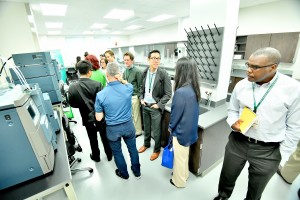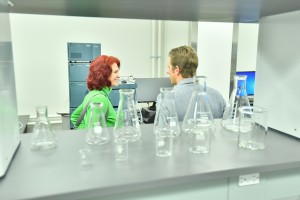
Participants at the 16th annual International Conference on the Science of Botanicals toured the Natural Products Training Center following its dedication ceremony. Photo by Kevin Bain/Ole Miss Communications
OXFORD, Miss. – The University of Mississippi School of Pharmacy and National Center for Natural Products Research, in partnership with Waters Corp., dedicated a state-of-the-art natural products training center including laboratories, an informatics suite and lecture space on Wednesday (April 13).
Alice Clark, UM vice chancellor of University Relations, welcomed participants and observers to the ceremony in the new Thad Cochran Research Center-West Wing. Making remarks were David D. Allen, dean of the pharmacy school; Steve McDonough, vice president of Waters’ North American field operations; Diane Diehl, Waters’ director of pharmaceutical marketing; and Larry Walker, NCNPR director.
The Natural Products Training Center was developed through collaboration between Ole Miss researchers and Waters Corp., said Don Stanford, assistant director of the university’s Research Institute of Pharmaceutical Sciences.
“NPTC will provide hands-on training in plant taxonomy, laboratory analytical techniques and quality standards for botanical-based products,” Stanford said. “In addition, the NPTC will expand the capabilities of the School of Pharmacy to discover new drugs and to expand the scientific knowledge base of medicinal plants and other natural products.”
Attendees at the International Conference on the Science of Botanicals, going on this week at the Oxford Conference Center, were invited to the ceremony, along with university administration, economic development, research park, legislative and local government officials. A reception and guided tours of the TCRC West Wing followed.
The training center includes five laboratories, occupying 3,000 square feet, that can be used to educate government officials, academic or industry professionals, and scientists on best practices in natural products and botanical dietary supplements. Courses taught by NCNPR personnel will offer hands-on training in laboratory methods, plant taxonomy and quality systems for laboratories, including guidance in good manufacturing practices for dietary supplements.
In addition, a number of support areas will be involved with NPTC workshops, including conference rooms and offices.
“This training lab was created while keeping the future of the dietary supplement industry in mind,” said Ikhlas A. Khan, NCNPR associate director. “This will be a great resource for people to get hands-on training and develop the skills to implement good manufacturing practices.”

Kelly Johnson (left), senior manager of worldwide strategic relations for Waters Corp., asks a UM pharmacy school student about research that will be conducted in the NPTC. Photo by Kevin Bain/Ole Miss Communications
NCNPR scientists leading one-, three- and five-day courses include Khan, Bharathi Avula, YanHong Wang, Vijay Raman and Lal Jayaratna.
According to the center’s mission, it will serve to ensure uniform scientific standards in the advancement of commercially viable natural products by “demonstrating leading-edge techniques using world-class analytical instrumentation.”
Waters provided several cutting-edge analytical systems and software as part of establishing the laboratory. These include three liquid chromatography/mass spectrometer systems, as well as an accelerated supercritical fluid extraction system, each designed for various applications.
“The ACQUITY UPLC/TQ-S® tandem quadrupole mass spectrometer provides ultimate sensitivity to identify and quantitate trace-level constituents of natural products,” Stanford said.
“Two other high-performance and ultra-performance liquid chromatographs, coupled to mass spectrometers, photodiode array and evaporative light-scattering detectors, will offer training experience in a multitude of applications. The Waters Empower enterprise network system will allow multiple users in the NPTC informatics training lab to control the instruments remotely.”
“Waters is committed to partnering with world-class experts to foster new ideas and promote innovation,” said Steve McDonough, vice president of Waters’ North American field operations. “The facility will increase scientific and regulatory knowledge and promote the use of global best practices in dietary and botanical supplement testing.”
The UM School of Pharmacy has long been involved in natural products research and education. The Research Institute of Pharmaceutical Sciences was founded in 1964 to explore natural products as sources for new drugs and new agricultural crops that would benefit Mississippi.
The NCNPR was founded in 1996 to discover new plant-derived pharmaceuticals and agrichemicals. After a partnership with FDA since 2000, the NCNPR botanical program was designated as the FDA Center of Excellence on Botanical Dietary Supplement Research in 2013.
Waters Corp. develops and manufactures advanced analytical and material science technologies for laboratory dependent organizations. For more than 50 years, the company has pioneered a connected portfolio of separation science, laboratory information management, mass spectrometry and thermal analysis systems.
For more information about the NPTC, visit http://umnptc.org.